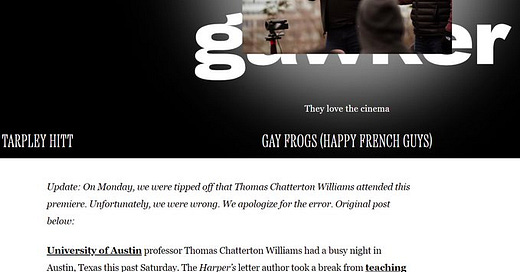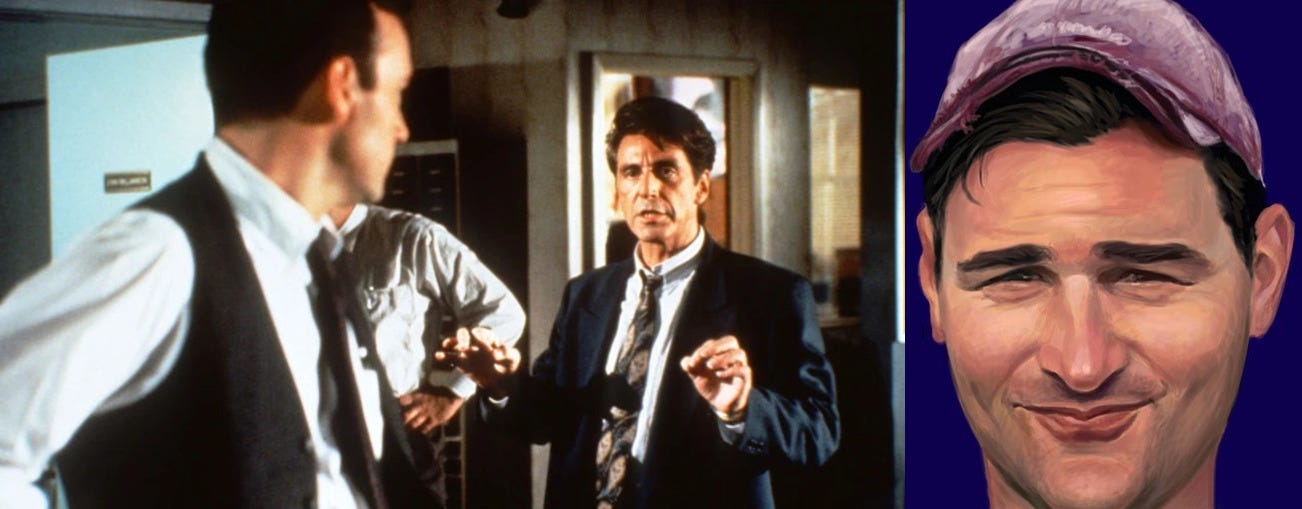Reaction Shots: OK Gawker
Plus Alex Lee Moyer and the Movie of the Week featuring James Caan and Paul Sorvino
Gawker has no shame. And it is hard to watch.
My generation will collectively reach the point where they are not just old, but are self-righteous about it once the younger cohort holds the key to the city. Age allows you the choice of maturation or to relive the glory days, insisting that the new generation can preserve whatever that exists, but remains dated and be grateful for it. I often associate these qualities with the worst boomers I know, but that applies to every generation. It’s fashionable to dunk on boomers because they are far more influential than we could even imagine. Yet this is a fact of the human condition that makes people vapid.
Speaking of vapid, did you know that Gawker is still alive? Following Hulk Hogan’s big lawsuit against them, bankrolled by Peter Thiel, everyone cheered on the Web 2.0 blog’s demise, while the blue check class, only occupied on Twitter, grieved on its grave and elaborated a shallow Memoriam of all the great things they have done. This kind of reaction isn’t new and isn’t typical for the average internet publication’s life cycle. Between birth and death, they were some great moments, yet to boil it down, Gawker barely had a net positive effect on its profession. They were notable for doxing - not just Hulk Hogan, but a Conde Nast executive rumoured to be gay - and the writers who were assigned to do the dirty work got away with little accountability.
Whenever I hear about the new version of Gawker, the game plan for them was predictable; freeze a target who seems sensible, but is apparently insidious. Rinse and repeat to see said target react with horror and disgust. Therefore, when Thomas Chatterton Williams, a writer whose views precisely fit the criteria of what they were looking for, along with a whole list of people like Glenn Greenwald and Anna Khachiyan. saw an article claiming that he was at the premiere of Alex Lee Moyer’s documentary about Alex Jones. He didn’t, of course, so Chatterton Williams become livid, and in reaction, the website’s adherents like Libby Watson had a laugh at him.

Not quite. The website made a part correction before removing it to oblivion (you can still find an archived version of it), upon Chatterton William’s intent to take them to court. An old story of course. Gawker’s stronghold on snark remains influential, as its writers trickled down into legacy outlets that are far more corporate and conformist, and create podcasts that try to emulate the stylings of Chapo Trap House. It is part of so-called anti-establishment rhetoric that used to be cherished and self-critiqued but is now the establishment that’s in love with itself, rather than attracting new readers. As one essay it once published in its old form, elaborated:
Smarm offers a quick schema of superiority. The authority that smarm invokes is an ersatz one, but the appearance of authority is usually enough to get by with. Without that protection, to hold an opinion is to feel bare and alone, one voice among a cacophony of millions.
Somehow, the self-awareness of the author who once wrote this paragraph must have sprinted like one of the characters from Get Out if you ever try to have a gander at his Twitter feed. But the thing is, the joke wasn’t funny and they already had established positions. Gawker reaches self-parody not simply by having rich kids fabricate lies so that their predecessors can (no pun intended) gawk at them for doing so. It’s that they became old. This is the successor ideology at work, but more importantly, it is the side effect of millennial malaise. Someone sue them out of their misery already.
Preview: Alex Lee Moyer’s TFW NO GF
There’s a documentary from Alex Lee Moyer that came out about the unpersoning of Alex Jones, which predictably inspired a wide array of opinions. Is it a glorification of the Sandy Hook truther, or is this a slight defence of him and his views? I am reposting a review I wrote on Moyer’s previous effort TFW NO GF, which was released at SXSW 2020 as an online exclusive. Like that film, there’s also a bit of venom made towards the filmmaker because of the subject matter at hand. In TFW NO GF, the documentary takes a look at a specific constituent of young white men, who are otherwise lonely and isolated, relying on the provocations of the Internet and becoming brief distinctive personalities. One of these involves a guy who went under the alias of Kantbot, who rambled about the emergence of German realism to some TV reporter when Donald Trump was elected as President in 2016.
I am reposting a review that I wrote of TFW NO GF for the defunct Rebeller Media. At the time, I presumed, like a lot of critics, that it was going to be an authoritative take on incels. After all, the traits of those subjects overlap. But in an interview with Matt Taibbi, Moyer clarified that it wasn’t, because she hadn’t thought about that phenomenon, even when it had a name. One may claim that she was being ignorant, and this criticism is usually coming from the lucrative cottage industry of digging up so-called right-wing extremism.
TFW NO GF had little distribution and Alex Lee Moyer went off the grid, hanging around with the more heterodox subset of the Internet like Glenn Greenwald (and not Thomas Chatterton Williams). Looking back, it is pretty much a curio as it was then. In that same interview with Taibbi, Moyer claimed these men she would count as sincere friends. But Moyer is building a name for herself to a terminally Online audience dabbled in Marxism and traditionalism. It would be important, not to put her aside.
Here’s an extract. (To read this in full, you should become a paying subscriber):
The coverage surrounding incels often focused on male entitlement. Yet the larger and revealing context is that they admit this is all a pose and a theatrical reaction to the harsh, atomized world to which they succumbed. It is a mostly male sphere, where millennials are having less sex, thanks largely to the maximal sexual choice offered by dating apps and pornography and financial uncertainties that trap them in their parents’ houses as they enter adulthood. These factors are hinted at in TFW No GF, rather than being explored thoroughly — a missed opportunity.
You Must Watch This: The Gambler (1974)
We heard the passing of two great actors, both being prominent in the mob genre: James Caan, most famous for playing Sonny Corleone in The Godfather and Paul Sorvino, who is more notable for playing Paulie in Goodfellas, next to Ray Liotta who also died this year. So it would be best to check out The Gambler, which starred both Caan and Sorvino. Written by James Toback and directed by Karel Reisz, Caan plays Axel Freed, an English professor with a huge gambling addiction. He has been pretty bad with his latest bets, that massive debt has come to bite him. Sorvino plays Alex’s bookie, who likes him personally but would destroy him professionally if he hasn’t paid.
The Gambler is James Toback’s first screenplay and it has the barebones of what you expect from a film about a gambling problem. In this case, it serves a slope for Axel Freed to go from being a half-decent person that you feel some sympathy for, only driven to desperation in becoming a scumbag. James Caan, coming off his breakthrough performance in The Godfather, has shown his true gravitas that, like in Thief, is channelled by an intensity that can be harnessed into something human. As for Sorvino, this is one of his typecast mob roles, but he is appropriately menacing.
ICYMI: A Bash With Labash
Finally blown the dust out with some Film Club, where I interviewed Armin Rosen, a staff writer at Tablet Magazine. Rosen writes about a lot of things there; recently he had a long profile of Ilhan Omar and how she became larger than life within American politics, which you should read. But he’s also into music, and I spoke to him about the role music journalism plays, and how it is challenged by the current cultural dogmas, before we dive into Werckmeister Harmonies. There are two versions, one of which is for premium subscribers. Here’s an extract from that version:
LoT: What are your favourite albums of all time?
Let’s limit it to five…
No Other by Gene Clark is a deeply personal and cosmologically scaled work of singer-songwriter country music and the outermost point of where the genre ever went and can possibly ever go. There are hard truths in every line, but the music is so sweeping and brilliant that it’s never a bummer to listen to.
Bob Dylan’s Blood on the Track is the ultimate album that feels like it’s actually a book-like it’s an anthology of essays, love letters, short stories, poetry, and memoir. It’s also one of the most blisteringly bitter records ever made, and thus encapsulates a range of fundamental questions about when and how art can ever cross lines of basic human decency. It’s genius at its angriest and messiest.
Isaac Hayes had a period in the late 60s and early 70s where he experimented with big band-type orchestration, but the one album where his entire musical vision realized its full potential in all its awesome grandeur is Hot Buttered Soul, maybe the most viscerally pleasurable album of the entire 1960s, or maybe of all time.
Then there’s another Film Club, this time with Matt Labash. Interculoting with Labash was wonderful and we talked about men’s magazines, Tom Wolfe, finally settleding with his favourite films Glengarry Glen Ross. I was so happy with the interview, that I let Labash cross-promoted a longer version of this interview on his own Substack, which as he informed me, was shared by none other than Jake Tapper. That version, delved into his friendships with Christopher Hitchens and Tucker Carlson, and right-wing comedians.







